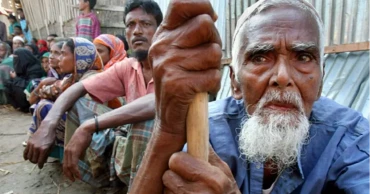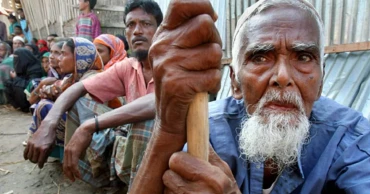Elderly
Despite economic success, rapidly-aging developing Asia unprepared to ensure elderly wellbeing: ADB
The number of people aged 60 and above in developing Asia and the Pacific is set to nearly double by 2050 to 1.2 billion—or about a quarter of the total population—significantly increasing the need for pension and welfare programs as well as healthcare services, said a new report on Thursday (May 02, 2024).
At the same time, economies have an opportunity to reap a “silver dividend” in the form of additional productivity from older people, which could boost gross domestic product in the region by 0.9% on average, said the Asian Development Bank (ADB).
“Asia and the Pacific’s rapid development is a success story, but it’s also fueling a huge demographic shift, and the pressure is rising,” said ADB Chief Economist Albert Park.
“Governments need to prepare now if they’re going to be able to help hundreds of millions of people in the region age well. Policies should support lifetime investment in health, education, skills, and financial preparedness for retirement. Family and social ties are also important to foster healthy and productive populations of older people and maximize their contribution to society.”
Developing Asia and the Pacific is unprepared to secure the well-being of its rapidly aging population as the growing share of older people in the region face challenges from low pension coverage to health problems, social isolation, and limited access to essential services, according to the multilateral development bank.
ADB, WTO strengthen collaboration for sustainable economic growth in Asia-Pacific region
While longer lifespans reflect the region’s development success, comprehensive policy reforms are urgently needed to support the welfare of older people, according to “Aging Well in Asia: Asian Development Policy Report,” released on Thursday by the Asian Development Bank (ADB) at its 57th Annual Meeting.
According to the report, 40% of people over age 60 in Asia and the Pacific lack access to any form of pension—with women disproportionately affected, as they are more likely to do unpaid domestic work.
As a result, many older people in the region have no choice but to work well beyond retirement age to survive.
Among those still working at age 65 or older, 94% work in the informal sector, which typically doesn’t provide basic labor protections or pension benefits.
Physical and mental health challenges also increase with age.
FBCCI urges govt policy to facilitate backward linkage industries
Around 60% of older people in Asia and the Pacific do not attend or receive regular health checks, while 31% report depressive symptoms owing to illness, social isolation, and economic insecurity.
Older women in the region are also more likely than older men to suffer from ill health, from depression to diabetes and hypertension.
The report recommended a wide range of policy measures to support healthy and economically secure aging.
Among these are government-assisted health insurance and pension plans, improved health infrastructure, and free annual check-ups and lifestyle evaluations.
Policy makers should aim for universal healthcare coverage, while basic labor protections should be extended to older informal workers, according to the report.
By making mandatory retirement ages more flexible, helping older people stay healthy, and providing them with suitable work opportunities as well as lifelong learning and skills development, economies in the region can help older people stay productive longer.
Read more: Developing Asian economies’ growth expected to be sustained at 4.9% this year and the next, ADB President says ahead of Annual Meeting
1 year ago
Summer Safety Tips for Elderly to Avoid Heat-related Illnesses
Global warming is making summers hotter and more humid. During the summer season, the oppressive heat can take a toll on anyone, particularly the senior citizens. Due to the sweltering heat of the sun, the temperature becomes unbearable, which is increasing the risk of heat-related illnesses. Therefore, it is crucial to ensure the safety and well-being of the elderly people.
Common Summer Heat-related Illnesses that Can Affect Senior Citizens
As people age, their bodies become less able to regulate their temperature. Elderly people especially face challenges in coping with the extreme temperatures, and their vulnerability to heat-related issues is a cause for concern.
Due to the heat and increased sun exposure, heat stroke, dehydration, and heat exhaustion are common concerns. Seniors may also experience exacerbation of chronic conditions, skin problems, and vitamin D deficiency.
Read more: Summer Heatwave: Here’s How to Keep Children Safe
10 Tips for Senior Citizens to Stay Healthy in Summer
These summer safety tips for the elderly aim to prevent heat-related illnesses.
Stay Hydrated
Sometimes elderly people forget to drink enough water. They should be encouraged to drink lots of fluids, particularly water, throughout the day. When it's hot, our bodies lose more water through sweat, making dehydration a real risk. By drinking plenty of fluids, senior citizens can keep their bodies hydrated and maintain their overall health.
Water is the best choice because it does not have any added sugar or calories. To make it easier, a water bottle can be stored nearby. They can also use mobile apps that will remind them from time to time to take a sip. Dehydration symptoms include feeling tired, dizzy, or having dry mouth, so it is essential to stay hydrated to prevent these issues and feel better during the summer heat.
Read more: Summer 2023: Ceiling Fan Buyer's Guide with Price Range in Bangladesh
2 years ago
‘Most elderly Bangladeshis I met said they feel like burden’: UN expert
Bangladesh must take concrete action to combat entrenched and pervasive ageism and follow through on its planned measures to ensure human rights protection of elderly persons, a UN expert said.
“I remain hopeful that Bangladesh will provide the appropriate political will and budgeting to strengthen the protection of older persons in the country,” Claudia Mahler, Independent Expert on the enjoyment of all human rights for older persons, told reporters in Dhaka on Thursday.
Concluding an 11-day visit here, the UN expert welcomed the existence of a dedicated National Policy on Older Persons, as a first commendable step.
“However, the lack of a time-bonding action plan to further its implementation remains problematic,” Mahler said.
More than nine years after its adoption, most of the priorities remain unattended.
Acknowledging the government’s ongoing challenges related to climate change and a growing economic and financial crisis, she called on the government to recognise older persons’ experiences, skills and contributions to their families and society at large.
“Such recognition would enhance support and protection to a growing proportion of the population that remains invisible,” Mahler said in a statement.
“Most of the older persons I met expressed often feeling like a burden to their family and the society, due the rampant structural ageism.”
Read more: Bangladesh faces a challenge in ensuring welfare of its aging population
While Bangladeshi society has a tradition of respecting and providing care for older relatives, their specific needs are easily ignored, she said.
“Older persons especially face structural ageist assumptions in the labour market, preventing those living in poverty to sustain themselves and their kin,” the expert said.
3 years ago
Elderly duo left for dead fearing infection in Savar
Two sexagenarians found abandoned out in the streets, apparently over fears of being infected by Coronavirus, were rescued and admitted to Savar Upazila Health Complex over Saturday and Sunday.
5 years ago





